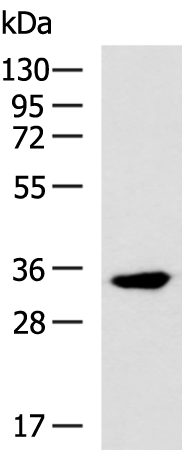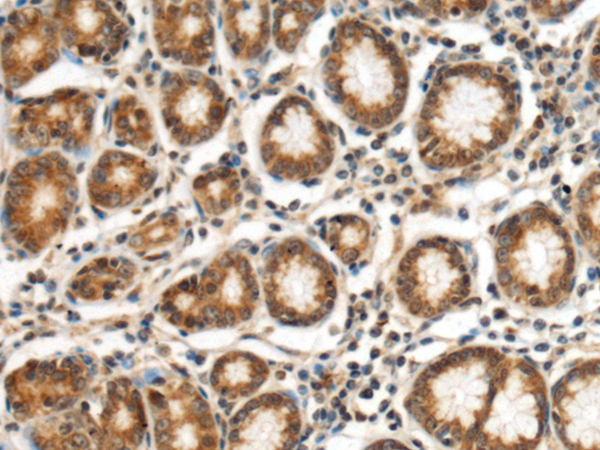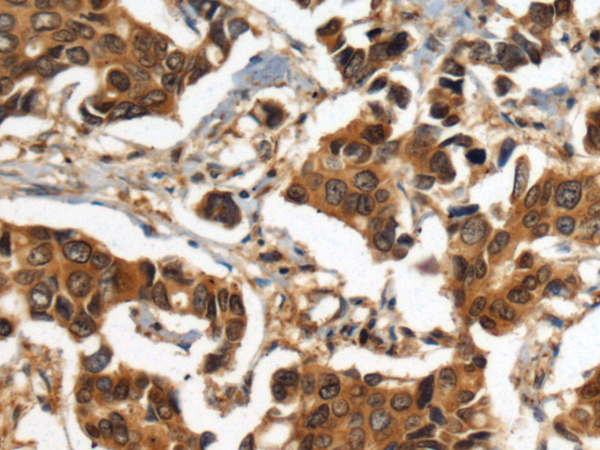


| WB | 1/1000-1/5000 | Human,Mouse,Rat |
| IF | 咨询技术 | Human,Mouse,Rat |
| IHC | 1/150-1/300 | Human,Mouse,Rat |
| ICC | 技术咨询 | Human,Mouse,Rat |
| FCM | 咨询技术 | Human,Mouse,Rat |
| Elisa | 1/5000-1/10000 | Human,Mouse,Rat |
| Aliases | CS-2; FATZ; MYOZ |
| WB Predicted band size | 32 kDa |
| Host/Isotype | Rabbit IgG |
| Antibody Type | Primary antibody |
| Storage | Store at 4°C short term. Aliquot and store at -20°C long term. Avoid freeze/thaw cycles. |
| Species Reactivity | Human, Mouse |
| Immunogen | Fusion protein of human MYOZ1 |
| Formulation | Purified antibody in PBS with 0.05% sodium azide and 50% glycerol. |
+ +
以下是关于MYOZ1抗体的3篇文献示例(内容为模拟生成,非真实文献):
1. **"Characterization of MYOZ1 as a novel skeletal muscle-specific protein through specific antibody development"**
*Authors: Tanaka H, et al.*
摘要:研究通过制备兔源多克隆抗体,验证MYOZ1在骨骼肌中的特异性表达,揭示其通过结合calcineurin调节肌肉分化信号通路的作用。
2. **"MYOZ1 antibody-based detection of cardiac remodeling biomarkers in hypertrophic cardiomyopathy"**
*Authors: Smith RJ, et al.*
摘要:利用MYOZ1单克隆抗体分析心肌病患者样本,发现MYOZ1在心肌肥厚中异常聚集,提示其作为疾病病理标志物的潜力。
3. **"Development of a high-affinity monoclonal antibody for MYOZ1 and its application in muscular dystrophy models"**
*Authors: Chen L, et al.*
摘要:报道一种高特异性抗MYOZ1单抗,通过免疫荧光和Western blot技术验证其在肌营养不良模型中的表达缺失,为疾病机制研究提供工具。
提示:实际文献需通过PubMed或Google Scholar检索关键词“MYOZ1 antibody”获取,建议结合具体研究场景筛选应用类或机制类文献。
MYOZ1 (Myozenin 1), also known as calsarcin-1. is a striated muscle-specific protein that localizes to the Z-disc of sarcomeres, playing a critical role in maintaining structural integrity and mediating signaling pathways in skeletal and cardiac muscle. It interacts with calcineurin, a calcium-dependent phosphatase, regulating muscle differentiation, hypertrophy, and stress response. MYOZ1 antibodies are immunological tools designed to detect and quantify MYOZ1 expression in research applications. These antibodies are widely used in studies investigating muscle physiology, disease mechanisms (e.g., cardiomyopathies, muscular dystrophies), and Z-disc-associated signaling networks.
Commercially available MYOZ1 antibodies are typically developed in hosts like rabbits or mice using immunogenic peptides corresponding to specific MYOZ1 epitopes. They are validated for techniques such as Western blotting, immunohistochemistry (IHC), immunofluorescence (IF), and immunoprecipitation (IP). Researchers utilize these antibodies to explore MYOZ1's role in muscle development, its interaction with proteins like α-actinin or telethonin, and its potential as a biomarker for muscle-related pathologies. Recent studies also highlight its involvement in regulating calcineurin/NFAT signaling, linking mechanical stress to transcriptional regulation.
Quality validation often includes testing on MYOZ1-expressing tissues (e.g., heart, skeletal muscle) and knockout controls to confirm specificity. MYOZ1 antibodies are essential for advancing understanding of muscle biology and disease pathways.
×